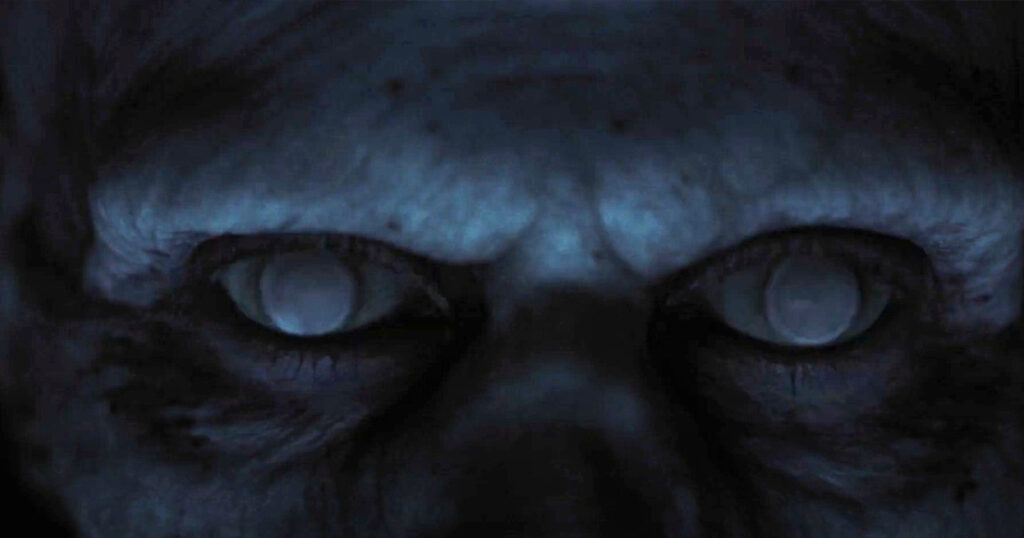[9]
With this re-telling of Dracula and Nosferatu, director Robert Eggers (The Witch, The Lighthouse) re-solidifies his position as the most exciting artist working in cinema today. Eggers casts Lily-Rose Depp and Nicholas Hoult as a Ellen and Thomas Hutter, a young couple living in 1838 Germany. Their lives are torn apart when Thomas, a real estate agent, is called upon to visit Transylvania where the reclusive and terrifying Count Orlok is eager to settle a land purchase. It turns out that the Count, played by a supremely creepy Bill Skarsgård (It, Barbarian), is relocating to Germany to be closer to Ellen, with whom he shares a mystical, frighteningly romantic connection. Thomas barely escapes Orlok’s grip and ends up joining forces with a doctor (The Witch‘s Ralph Ineson) and a disgraced occult expert (Willem Dafoe as the film’s Van Helsing equivalent) to stop Orlok from spreading a deadly plague to Germany and consummating his carnal desires for Ellen.
Even though this story is a very familiar one, Eggers manages to distinguish it with deeper psychological and atmospheric terror than we’ve ever seen before. The relationship between Orlok and Ellen is far more troubling here — anchored by a mutual, primal lust and propelled by Orlok’s ability to demonically control Ellen in a handful of Exorcist-level possession scenes. The film explores the dark side of human sexuality, culminating in a fresh twist on the climactic consummation scene — one that pays visual homage to F.W. Murnau’s silent 1922 classic while making us feel something new and more profound. Despite how horrific Orlok is, the film still manages to create ‘sympathy for the Devil’ in a genuinely moving way — a fete I found very impressive.
Skarsgård, Hoult, and Ineson give strong performances. Aaron Taylor-Johnson (Kick-Ass, Godzilla) has a juicy supporting role, playing a man whose family is decimated by Orlok, sending him into a tragic spiral culminating in necrophilia. Simon McBurney succeeds in the darkly comedic role of Knock/Renfield, the vampire’s right-hand familiar. Lily-Rose Depp, on the other hand, falters in the role of Ellen. In the first half of the movie, her performance often feels overly-theatrical and emotionally forced. (Is it just me, or do her constantly half-closed eyes grate on the nerves?) She is much better in the film’s second half, when Orlok possesses her and she channels her inner Linda Blair. The other casting qualm I have is one I am reluctant to even mention because I love Willem Dafoe so much. He’s perhaps one of my favorite actors working today, but his casting here is an uninspired choice. He is good — he always is — but I can’t help think that another actor might have been able to do more with his character.
Those looking for a contemporary horror film with plentiful gore and quick-paced visceral thrills will probably be disappointed in Nosferatu, which is more of a dark drama or a psychological thriller. If you’re like me, you don’t like modern convention anyway. It’s the scariest version of Nosferatu yet put to film, not to mention the most realistic and believable, grounded by Eggers’ trademark attention to detailed, period accuracy. Like all Eggers’ other films, it is gorgeously executed and exquisitely paced. I was constantly enraptured by it’s creepy ambience, stunning photography, and haunting sound design. Despite minor casting qualms, I think it’s Eggers’ best film since his auspicious 2015 debut, The Witch. Eggers is a bright, shining beacon of hope and inspiration during this dark nadir of film history.
Oscar Nominations: Best Cinematography, Production Design, Costume Design, Makeup & Hairstyling

